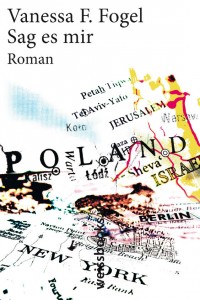During the week of 21 to 27 October 2013, the Academy of the Jewish Museum Berlin, in cooperation with Kulturkind e.V., will host readings, workshops, and an open day for the public with the theme “Multifaceted: a book week on diversity in children’s and young adult literature.” Employees of various departments have been vigorously reading, discussing, and preparing a selection of books for the occasion. Some of these books have already been introduced here over the course of the last weeks.
 When my little 6-year-old daughter said to me, “you know, Mama, being gay seems strange to me,” I didn’t discuss it with her for too long. Instead I headed out and bought a copy of Alles Familie! Vom Kind der neuen Freundin vom Bruder von Papas früherer Frau und anderen Verwandten (All in the Family! About Daddy’s ex-wife’s brother’s new girlfriend’s kid and other relatives) since nothing is strange in this book. Every form of cohabitation that people engage in is introduced completely impartially: → continue reading
When my little 6-year-old daughter said to me, “you know, Mama, being gay seems strange to me,” I didn’t discuss it with her for too long. Instead I headed out and bought a copy of Alles Familie! Vom Kind der neuen Freundin vom Bruder von Papas früherer Frau und anderen Verwandten (All in the Family! About Daddy’s ex-wife’s brother’s new girlfriend’s kid and other relatives) since nothing is strange in this book. Every form of cohabitation that people engage in is introduced completely impartially: → continue reading
Virtually Every Form of Human Coexistence
Granddaughters,
or “Being who I am”
“The night before I fly to Germany to see my grandfather Mosha, I meet someone, take him home with me, and for the first time in my life, I sleep with a man.”
This sentence begins the first chapter of the 2010 novel Sag es mir (Tell it to me) by Vanessa F. Fogel. The author was born in 1981 in Frankfurt and grew up in Israel. She introduces the first-person narrator of this autobiographical novel both as a granddaughter and as a confident young woman right from the start. And despite her imminent trip to the sites of extermination – she meets her grandfather in Berlin and they travel together to Poland – her emphasis is on vitality and the joys of living.
The Frankfurt publishing house weissbooks has now taken on another Jewish writer of “the third generation.” Channah Trzebiner is a lawyer, also born in 1981 in Frankfurt, where, unlike Fogel, she still lives. She has written Die Enkelin (The Granddaughter), which is more of “a kind of inner monologue” than a novel. This book also begins confidently: “I accept the woman that I am.” At once, however, the author alerts her reader to the difficult process underlying this claim:
“For years I cut off my connection to the innermost ‘I’ […], so that I could be the substitute for a life ended by murder. How I could have done otherwise? I’m called Channah after my grandmother’s youngest sister […].”
A Story of Migration that’s Suitable for Children
During the week of 21 to 27 October 2013, the Academy of the Jewish Museum Berlin, in cooperation with Kulturkind e.V., will host readings, workshops, and an open day for the public with the theme “Multifaceted: a book week on diversity in children’s and young adult literature.” Employees of various departments have been vigorously reading, discussing, and preparing a selection of books for the occasion. Some of these books have already been introduced here over the course of the last weeks.

Unlike German literature for young adults, the range of children’s books on the subject of diversity is still marginal. Usually books about diversity are transposed to the animal kingdom, or they depict ‘alien’ cultures by having foreign children invite their German school friends to an ethnic celebration. The Jewish Passover holiday, the Muslim Eid-al-Fitr, or, alternatively, the Chinese New Year, are described with one and the same formula: mom prepares the celebratory meal, dad explains the origins of the holiday, and the kids watch the central rites until they have to go to bed. Most of these books have no real plot.
Ingke Brodersen chose a different approach: she tells her story from the perspective of a little boy named Sascha, who emigrated from Russia to Berlin. → continue reading
